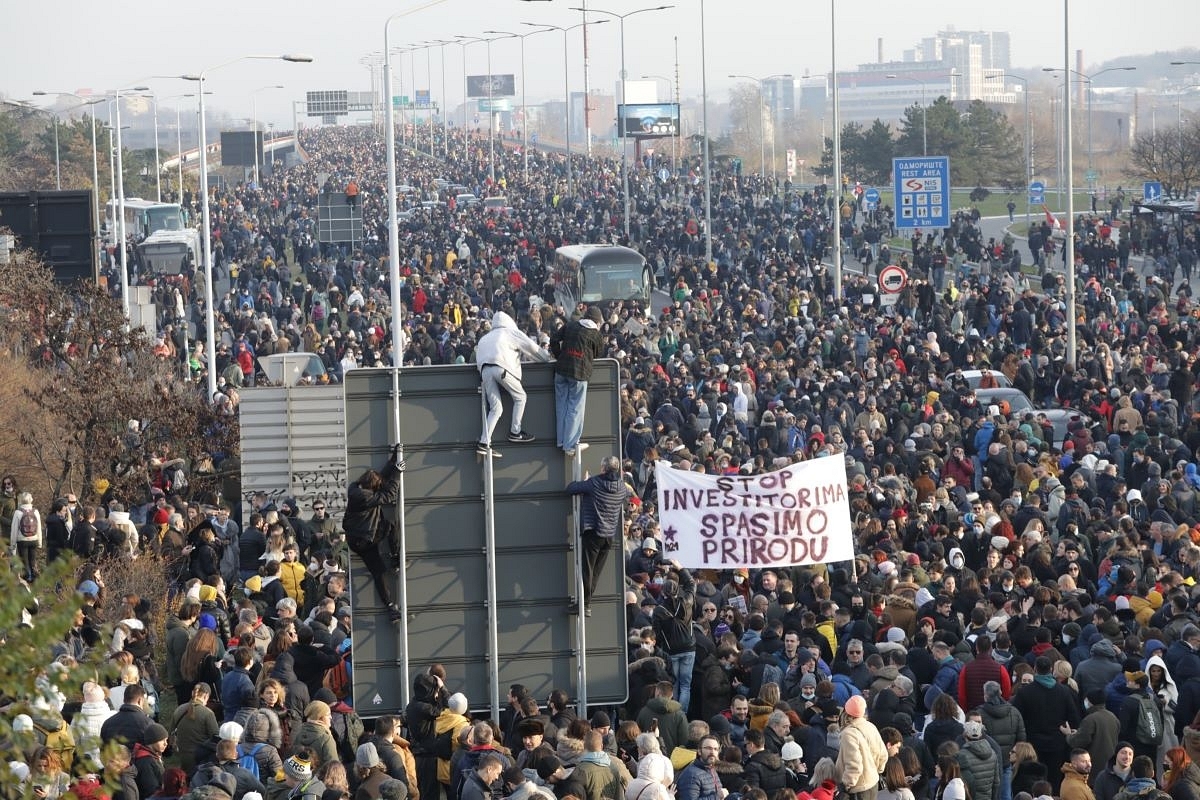News Brief
Serbia: After Forcing Government To Scrap Rio Tinto Lithium Mining Project, Eco-activists Launch Protest For Nationwide Lithium Mining Ban

Protest In Dec 2022 Against Lithium Mining In Serbia (Igor Pavicevicc)
After forcing Serbian government to scrap the $2.4 billion lithium project of Anglo-Austalian mining giant Rio Tinto, environmental activists have launched a protest demanding for a nationwide ban on lithium mining and exploration.
Serbian eco-activists, who have set up several tents outside the Serbian presidency building, say they fear reinstatement of the Jader lithium mining project after April’s general elections. They are demanding a new legislation that will ban mining by Rio Tinto or any other company. Protesters have also criticised an effort to speed up ownership changes for both state and private mining projects. President Aleksandar Vučić was forced to beat a retreat and send the proposal back to parliament for reworking.
"We have one clear demand - a law which should forbid exploring borate and lithium," AP quoted activist Savo Manojlovic of the Kreni-Promeni, or Go-Change, as saying.
On Jan 20, Serbian Prime Minister Ana Brnabic announced the cancellation of a plan to allow Anglo-Australian mining giant Rio Tinto to build a lithium mine. The decision was forced after major protests erupted across the country demanding the cancellation of the mining project.
In December 2021, thousands of environmental protesters took to the streets in Belgrade demanding that the proposed project be scrapped. They blocked major roads, bringing traffic in the capital to a complete halt. The protesters also expressed concern over the 'amount of pollution' the mine would create.
The protests were organised by groups like Ecological Uprising, the Alliance of Environmental Organizations of Serbia (SEOS), civic platform Akcija, Don’t Let Belgrade Drown movement and others.
The local community has been opposed to project saying that it will destroy scenic landscape and will require acquiring farmlands.
Lithium Mining Project
The Jadar project in western Serbia near the town of Loznica, discovered in 2004, is Rio Tinto’s flagship project in the batteries minerals sector.
Rio Tinto was committed to investing $2.4 billion to construct the mine. At full capacity, the Jadar mine was expected to produce 58,000 tonnes of refined battery-grade lithium carbonate a year, making it Europe’s biggest lithium mine by output. Jadar lithium project was planning to commence production in 2027.
Rio Tinto may have already spent US$450 million in pre-feasibility, feasibility and other studies in Jadar to understand the nature of the Jadar deposit.
Lithium is a critical component in battery making. Electric Vehicle(EV) batteries rely on a host of rare materials – from Lithium and Nickel, to Cobalt. With growth in EV industry, use of these rare elements is expected to increase, and therefore could lead to supply chain issues in future as availability of these rare elements is concentrated in few countries only.
Building Batter Ecosystem In Serbia
Serbian government was hoping to leverage its huge lithium deposits to build an integrated battery supply chain.
The government was hoping that the Jadar project will kickstart an investment cycle in the country and help develop a battery supply chain ecosystem
As the largest greenfield mining investment in Serbia, the project promised to make 1 per cent direct and 4 per cent indirect contribution to the country’s GDP, with many Serbian suppliers being involved in the construction of the mine. The project had significant employment potential, creating 2,100 jobs during construction and 1,000 mining and processing jobs once in production.
Also Read: Serbian Government Castigates Environmental Groups For Protests That Forced It To Scrap Rio Tinto’s Jadar Lithium Mining Project
Support Swarajya's 50 Ground Reports Project & Sponsor A Story
Every general election Swarajya does a 50 ground reports project.
Aimed only at serious readers and those who appreciate the nuances of political undercurrents, the project provides a sense of India's electoral landscape. As you know, these reports are produced after considerable investment of travel, time and effort on the ground.
This time too we've kicked off the project in style and have covered over 30 constituencies already. If you're someone who appreciates such work and have enjoyed our coverage please consider sponsoring a ground report for just Rs 2999 to Rs 19,999 - it goes a long way in helping us produce more quality reportage.
You can also back this project by becoming a subscriber for as little as Rs 999 - so do click on this links and choose a plan that suits you and back us.
Click below to contribute.
Latest